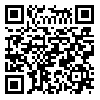Volume 2, Issue 1 And 2 (23 2006)
irje 2006, 2(1 And 2): 21-25 |
Back to browse issues page
Download citation:
BibTeX | RIS | EndNote | Medlars | ProCite | Reference Manager | RefWorks
Send citation to:



BibTeX | RIS | EndNote | Medlars | ProCite | Reference Manager | RefWorks
Send citation to:
Chaman R, Shamshiri A, Kamali K, Khalili G, Holakouie Naieni K. Trends in Nested Case-Control Studies as Compared to Case-Control and Cohort Designs, 1996-2005. irje 2006; 2 (1 and 2) :21-25
URL: http://irje.tums.ac.ir/article-1-183-en.html
URL: http://irje.tums.ac.ir/article-1-183-en.html
Abstract: (17932 Views)
Background & Objectives: This investigation was prompted by the growing importance of nested case-control studies and the increasing frequency with which they are done in epidemiologic research. After a brief explanation of nested case-control studies, we evaluate the trends in research methodology over the last decade, especially with regard to cohort, case-control, and nested case-control designs.
Methods: Data for this study were extracted from the PubMed database, using these keywords: Nested Case-Control, Risk-Set Sampling and Density Sampling. The search was confined to the 10-year period from 1996 to the end of 2005. As for other methodologies, we used keywords Cohort and Case-Control for a search over the same time period. The search itself was performed on April 25, 2006.
Results: We found 2011 articles reporting nested case-control studies. There were 95 such articles in 1996 the number had increased to 289 in 2005. Case-control and cohort designs accounted for 68456 and 60479 articles, respectively. The number of case-control articles rose from 4378 in 1996 to 10270 in 2005, while that of cohort articles increased from 2981 to 9771 over the same period.
Conclusions: The number of cohort and nested case-control articles followed similar upward trends over the last decade and their rate of increase was greater than that of simple case-control articles.
Methods: Data for this study were extracted from the PubMed database, using these keywords: Nested Case-Control, Risk-Set Sampling and Density Sampling. The search was confined to the 10-year period from 1996 to the end of 2005. As for other methodologies, we used keywords Cohort and Case-Control for a search over the same time period. The search itself was performed on April 25, 2006.
Results: We found 2011 articles reporting nested case-control studies. There were 95 such articles in 1996 the number had increased to 289 in 2005. Case-control and cohort designs accounted for 68456 and 60479 articles, respectively. The number of case-control articles rose from 4378 in 1996 to 10270 in 2005, while that of cohort articles increased from 2981 to 9771 over the same period.
Conclusions: The number of cohort and nested case-control articles followed similar upward trends over the last decade and their rate of increase was greater than that of simple case-control articles.
Type of Study: Research |
Subject:
General
Received: 2006/04/26 | Accepted: 2006/07/15 | Published: 2013/09/8
Received: 2006/04/26 | Accepted: 2006/07/15 | Published: 2013/09/8
| Rights and permissions | |
 |
This work is licensed under a Creative Commons Attribution-NonCommercial 4.0 International License. |





